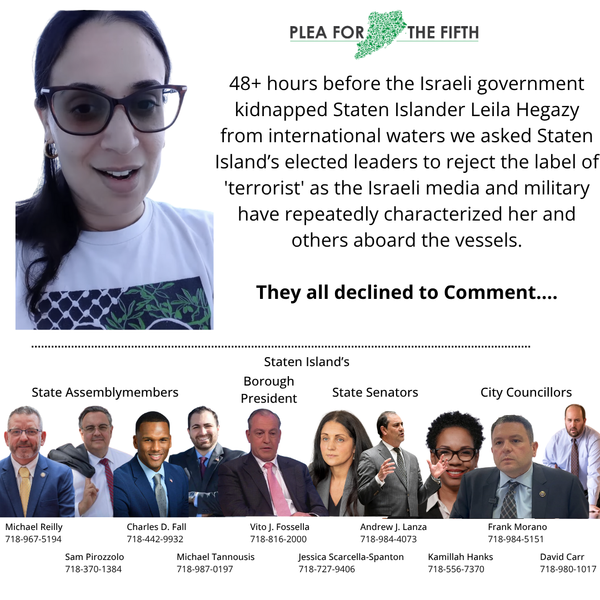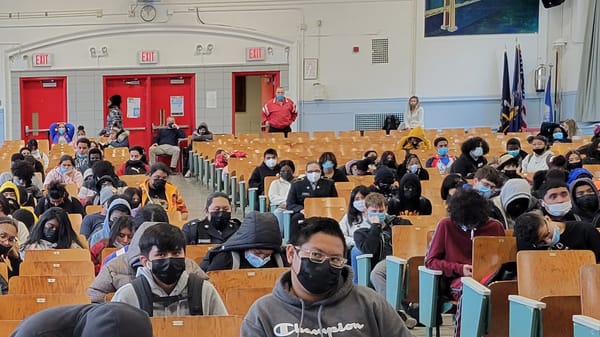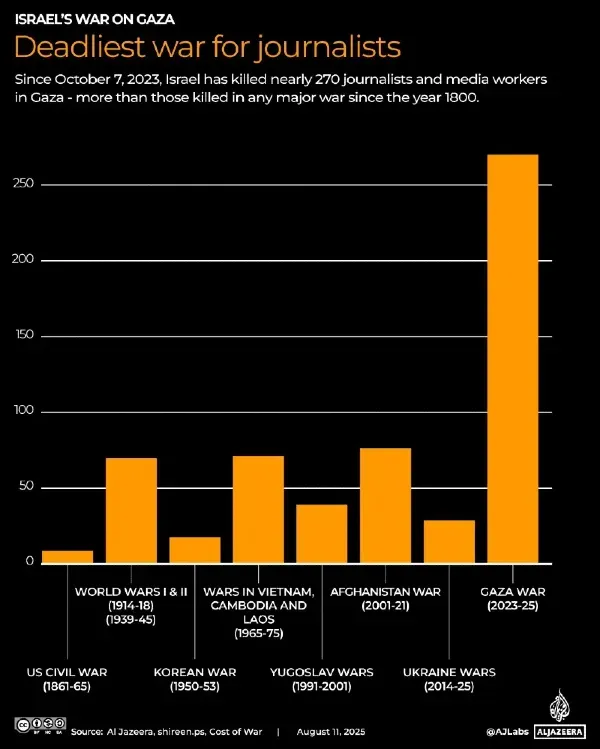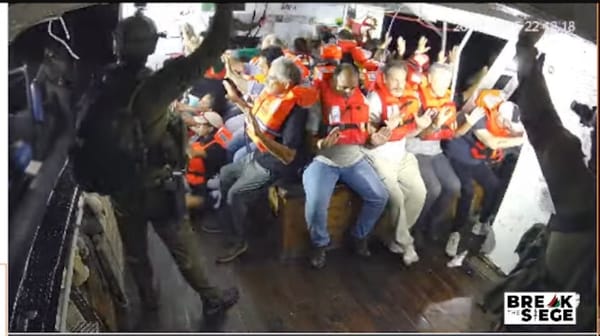Local Musician Aboard International Effort to Break Starvation Siege on Gaza
It's the second attempt this year involving Staten Islanders to provide humanitarian aid to the two million Palestinians Israel is starving and ethnically cleansing.
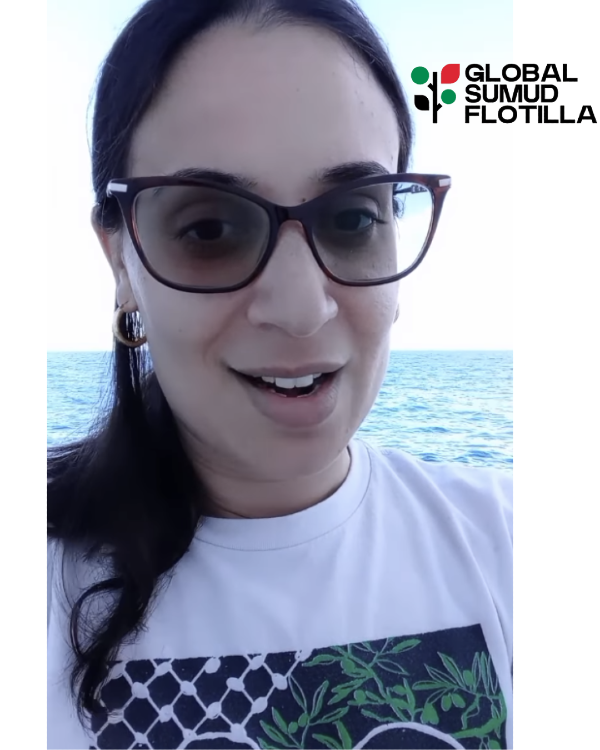
Local musician and activist Leila Hegazy has joined one of the boats of the Global Sumud Flotilla. This fleet is the largest civilian aid convoy since Israel’s war on Gaza escalated in October 2023. It set sail from Barcelona carrying humanitarian aid and international solidarity to break Israel’s 18-year siege on Gaza, which has pushed the Palestinian enclave into a man-made famine.
“It felt like history,” Hegazy told Plea for the Fifth in a conversation just hours after departure. “There were thousands of people at the port chanting Free Palestine in so many languages. I’ve never experienced anything like it.”
Hegazy is not the first Staten Islander to put their body on the line to break this blockade. Just weeks ago, Chris Smalls former Amazon Labor Union president joined the Handala, another flotilla carrying baby formula, food, and medicine. The Israeli military intercepted the vessel in international waters, detaining and physically assaulting Smalls before deporting him. Despite his national prominence, major U.S. outlets ignored the story. Plea for the Fifth covered it in depth; you can read that report here.
Both Smalls and Hegazy’s participation underscores Staten Island’s place in an international movement of resistance and solidarity.
The Global Sumud Flotilla is a coordinated fleet of mostly small vessels sailing from ports across the Mediterranean. It unites a coalition of international participants, including those involved in previous land and sea efforts, like the Freedom Flotilla Coalition, Maghreb Sumud Flotilla, and Global Movement to Gaza.
Importantly, this action is legal under maritime law, in which civilian vessels carrying humanitarian aid or engaging in peaceful protest in international waters are protected. By contrast, Israel’s nearly 20-year blockade of Gaza constitutes collective punishment, a violation of the Geneva Conventions, and therefore illegal under international law.
Hegazy shared: “We’re the ones following international law. The siege is illegal. We’re sailing to end it.”
Israel enforces a total siege by land, sea, and air. Aid entering Gaza through land crossings is restricted, delayed, or turned into deadly traps by the Israeli military and its U.S.-backed partners. By sea, international activists can confront the blockade directly.
The flotilla relies on small-to-mid-sized vessels due to their agility, legal viability, and difficulty to obstruct. Unlike large, slow-moving ships that can be easily detained, the flotilla’s model allows hundreds of smaller boats to carry aid and messages of solidarity. Each is overseen by a regional delegation including legal, nautical, and logistical support.
Participants undergo vetting and safety preparation. The risks are real. Israel has bombed previous flotillas, killing civilians. But organizers emphasize that “the greater danger lies in allowing Israel and its allies to carry out genocide with impunity.”
For Hegazy, joining the flotilla is about more than aid delivery. It is about accountability.
“I’m from the United States, and my government is complicit in this genocide. It could stop it with a phone call, and it refuses to,” she said. “If our governments won’t act, the people will.”
The flotilla is designed to be both symbolic and practical: to directly challenge the blockade while opening a corridor for aid. Participants include public figures, journalists, and everyday people from across the globe. The organizers deliberately placed public figures on each boat as a safety strategy, ensuring that those with platforms could amplify events in real time and help shield fellow passengers from unaccountable violence or disappearances.
Hegazy underscored the stakes: “Past flotillas have been intercepted in international waters. Activists have been kidnapped, jailed, and killed. It’s piracy. It’s a war crime. But every time, people have said: We’ll be back, bigger next time. This fleet is the biggest ever.”
When asked how Staten Islanders are connected to the siege of Gaza, Hegazy didn’t hesitate.
“Staten Islanders are workers. Our tax dollars are funding the genocide. We’re paying for bombs instead of affordable housing, child care, or climate resilience in the U.S. New York City is the capital of Zionist institutions outside D.C. Meanwhile, Staten Islanders face a crushing affordability crisis. The connection is direct.”
She also pointed to the role of local representatives. In Smalls’ case, despite his brutalization, there was silence from Staten Island’s own Congresswoman Nicole Malliotakis. “We are her constituents. Whether or not she acts, she should feel pressure to protect us,” Hegazy stressed.
“Staten Islanders need to make noise,” Hegazy urged, “We are their constituents.”
Hegazy’s call to action was clear: break the media blockade along with the naval one.
- Amplify: Share flotilla updates widely. “The more visibility the mission has, the less Israel can get away with,” she said.
- Demand accountability: Contact Congressperson Malliotakis' Office to pressure Nicole to protect a Staten Islander abroad conducting a humanitarian mission.
- Keep focus on Gaza: “We’re not saviors. We’re here in solidarity. The real focus has to stay on Palestinians and what they’re facing daily under siege.”
To follow developments, Hegazy pointed readers to the flotilla’s Linktree and public Telegram channel.
The mission is called Sumud, the Arabic word for perseverance. Days into the journey, the flotilla already faced rough seas, with several smaller boats forced to turn back. But organizers insisted the effort continues.“We won’t be intimidated by weather, we won’t be intimidated by threats,” Hannah Smith told Middle East Eye after the storm.
The remaining vessels are pressing forward, while those that turned back resailed a few days later.
Staten Island’s struggles against housing insecurity, racialized policing, and climate catastrophe are not separate from global struggles against war and occupation. When Staten Islanders like Leila Hegazy risk their lives to stand with Palestinians, they remind us that solidarity is not abstract. It is about where our tax dollars go and whose lives are valued.
In Hegazy’s words:
“Worldwide accountability starts with local accountability.”

